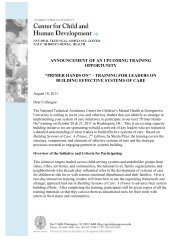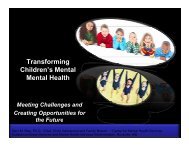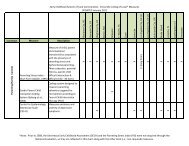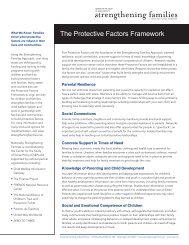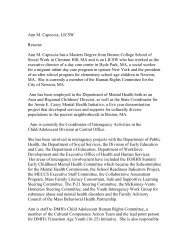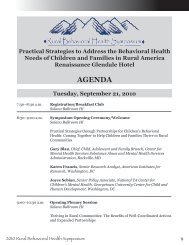Training Institutes 2012 - National Technical Assistance Center for ...
Training Institutes 2012 - National Technical Assistance Center for ...
Training Institutes 2012 - National Technical Assistance Center for ...
Create successful ePaper yourself
Turn your PDF publications into a flip-book with our unique Google optimized e-Paper software.
INSTITUTES<br />
INSTITUTE #24 8:30 AM FRIDAY • 1:30 PM SATURDAY • SARASOTA 1-2-3<br />
Home-Based Parent-Child Interaction Therapy (PCIT): Implementing an Evidence-Based<br />
Treatment Within a System of Care<br />
OBJECTIVES—Participants will learn:<br />
1. To describe the core elements of PCIT<br />
2. To employ strategies <strong>for</strong> the statewide PCIT dissemination and implementation<br />
3. How to combine Home-Based PCIT with wraparound services to produce a customized, evidence-based treatment<br />
within a system of care<br />
4. To determine how cultural factors, particularly those of race, ethnicity, and language are addressed through Home-<br />
Based PCIT<br />
5. To determine ways in which families can shape the system of care to better integrate and improve interventions like<br />
Home-Based PCIT<br />
6. To describe practical steps that communities can take to adopt, improve, or sustain the delivery of evidence-based<br />
mental health services <strong>for</strong> young children<br />
This Institute will focus on the implementation of an evidence-based practice within a system of care framework based<br />
on the implementation of PCIT. PCIT is an evidence-based mental health treatment <strong>for</strong> young children (ages 2-7) with<br />
behavioral difficulties and their families. It is a short-term, assessment-driven intervention that helps parents and<br />
children to develop and master a set of skills. Through a live coaching <strong>for</strong>mat, parents are taught specific skills, which<br />
help to foster a nurturing and secure relationship with their child while increasing their child’s pro-social behavior and<br />
decreasing negative behavior.<br />
The strategies to be presented are based on an initiative in Delaware entitled: “Delaware’s B.E.S.T. <strong>for</strong> Young Children<br />
and Their Families.” Through this initiative, PCIT has been disseminated and implemented statewide. Faculty will<br />
highlight strategies <strong>for</strong> implementation of an evidence-based practice including funding, training, implementation,<br />
consumer experience, data collection, and sustainability.<br />
Specific topics to be covered include:<br />
• Overview of PCIT’s theoretical underpinnings, clinical techniques, and modifications to the home-based setting<br />
• Specific techniques to clinically implement and sustain large-scale implementation of an evidence-based treatment<br />
and the challenges inherent in the training and dissemination processes<br />
• The data collection process including the infrastructure needed to collect data and how to collect short- and long-term<br />
outcome data<br />
• Cultural perspectives from a clinician’s and parent’s standpoint highlighting strategies <strong>for</strong> providing services within a<br />
cultural framework<br />
• A parent’s “journey” from treatment participant to an active driver of system of care<br />
Role-playing activities will help participants learn the power of simple techniques employed in PCIT as well as challenges<br />
associated with training providers. A workgroup structure will allow participants to choose a training experience around<br />
PCIT fundamentals, keys to family-driven care, and system design and evaluation. In addition to hearing a family<br />
member’s experience, participants will meet several other families involved in shaping Delaware’s B.E.S.T. through<br />
video clips. The Institute is designed to in<strong>for</strong>m other communities in their ef<strong>for</strong>ts to prepare and adopt evidence-based<br />
treatments in their settings. Faculty includes the perspectives of a trainer, evaluator, clinician, and family member.<br />
MODERATOR/PRESENTER: Joshua Masse, Ph.D., Clinical Trainer, Delaware’s Division of Prevention and<br />
Behavioral Health Services, Delaware’s Children Department, Newark, DE<br />
Tim Fowles, Ph.D., Assistant Professor, University of Delaware, Newark, DE<br />
Pippa Howard, L.C.S.W., Community Mental Health Clinician, Latin American Community <strong>Center</strong>, Wilmington, DE<br />
Chanelle Ringgold, Family Member, New Castle, DE<br />
56 <strong>Training</strong> <strong>Institutes</strong> <strong>2012</strong>



